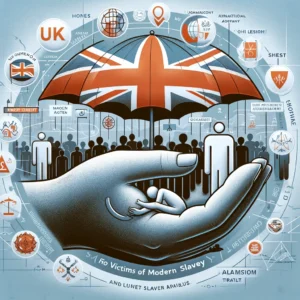UK Modern Slavery Law: Victim Support Framework
This article fully explores the UK immigration route for Victims of Human Trafficking and Slavery and is divided into three parts for easier navigation. This section is part two. You can continue reading with part one HERE and part three HERE.
Understanding the complex legislative landscape surrounding modern slavery is essential for grasping how the UK supports and protects victims. This intricate network of international obligations, domestic legislation, and specific immigration rules forms the backbone of the UK’s efforts against modern slavery.
International Obligations and Conventions
Council of Europe Convention on Action against Trafficking (ECAT)

Reviewing evidence carefully is a key part of making decisions. The Home Office gives priority to documents that can be checked and verified, making sure that every decision is based on reliable and solid information, with a strong focus on what’s best for the child. This approach shows the UK’s strong commitment to protecting and supporting child victims of modern slavery, ensuring that their safety and well-being are always a main concern in immigration matters.
Palermo Protocol
The Palermo Protocol , under the United Nations, aims to prevent, suppress, and punish human trafficking, with a focus on women and children. It supplements the UN Convention against Transnational OrganiSed Crime, representing a global commitment to combating trafficking.
European Convention on Human Rights
This convention outlines fundamental rights and freedoms within European signatory states, including the UK. These rights were integral to UK law even before the convention’s establishment, ensuring a robust framework for individual protections.
Domestic Legislation
Modern Slavery Act 2015
The Modern Slavery Act 2015 marked a significant milestone in the UK’s fight against modern slavery. It equipped law enforcement with necessary tools, introduced life sentences for perpetrators, and enhanced victim protection measures.
Nationality and Borders Act 2022
The Nationality and Borders Act 2022 (NAB Act) incorporates modern slavery victims’ rights into domestic law. It clarifies entitlements to recovery periods and tailored support, aiding early victim identification and underpinning legal aid provisions. The NAB Act, particularly Section 65, alongside the Immigration Rules’ Appendix VTS, sets out the legal framework for granting temporary permission to stay to confirmed victims.
Immigration Rules

The Appendix VTS of the Immigration Rules details criteria for granting stay permissions and considers grounds for refusal or cancellation. It outlines:
- Circumstances under which granting stay to confirmed victims and their dependents might be inappropriate.
- Eligibility requirements for granting permission to stay.
- Conditions and periods of stay.
- Requirements for dependent children of victims to obtain stay permission.
- Situations warranting the cancellation of granted permissions.
THIS articles explains the rules.
